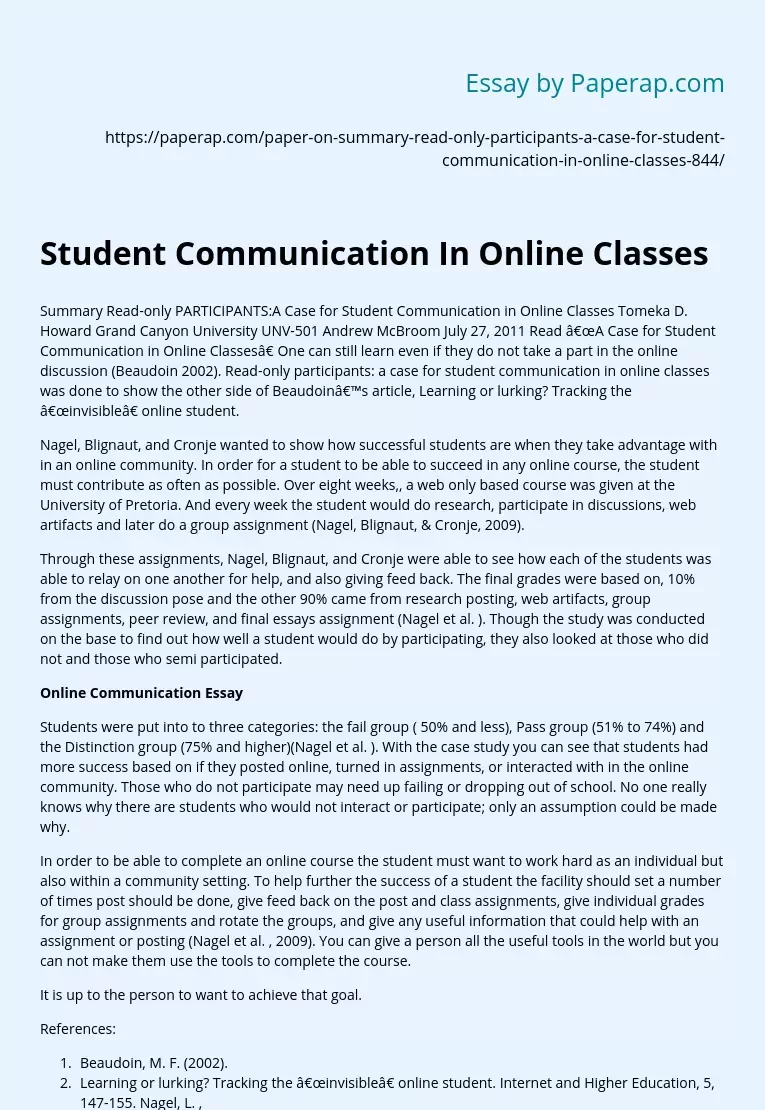Student Communication In Online Classes
Summary Read-only PARTICIPANTS:A Case for Student Communication in Online Classes Tomeka D. Howard Grand Canyon University UNV-501 Andrew McBroom July 27, 2011 Read “A Case for Student Communication in Online Classes” One can still learn even if they do not take a part in the online discussion (Beaudoin 2002). Read-only participants: a case for student communication in online classes was done to show the other side of Beaudoin’s article, Learning or lurking? Tracking the “invisible” online student.
Nagel, Blignaut, and Cronje wanted to show how successful students are when they take advantage with in an online community.
In order for a student to be able to succeed in any online course, the student must contribute as often as possible. Over eight weeks,, a web only based course was given at the University of Pretoria. And every week the student would do research, participate in discussions, web artifacts and later do a group assignment (Nagel, Blignaut, & Cronje, 2009).
Through these assignments, Nagel, Blignaut, and Cronje were able to see how each of the students was able to relay on one another for help, and also giving feed back.
The final grades were based on, 10% from the discussion pose and the other 90% came from research posting, web artifacts, group assignments, peer review, and final essays assignment (Nagel et al. ). Though the study was conducted on the base to find out how well a student would do by participating, they also looked at those who did not and those who semi participated.
Online Communication Essay
Students were put into to three categories: the fail group ( 50% and less), Pass group (51% to 74%) and the Distinction group (75% and higher)(Nagel et al.
). With the case study you can see that students had more success based on if they posted online, turned in assignments, or interacted with in the online community. Those who do not participate may need up failing or dropping out of school. No one really knows why there are students who would not interact or participate; only an assumption could be made why.
In order to be able to complete an online course the student must want to work hard as an individual but also within a community setting. To help further the success of a student the facility should set a number of times post should be done, give feed back on the post and class assignments, give individual grades for group assignments and rotate the groups, and give any useful information that could help with an assignment or posting (Nagel et al. , 2009). You can give a person all the useful tools in the world but you can not make them use the tools to complete the course.
It is up to the person to want to achieve that goal.
References:
- Beaudoin, M. F. (2002).
- Learning or lurking? Tracking the “invisible” online student. Internet and Higher Education, 5, 147-155. Nagel, L. ,
- Blignaut, S. , & Cronje, J. (2009).
- Read-only participants: a case for student communication in online class.
- Interactive Learning Environments, 17(1), 37-51.
- Retrieved from http://web. ebscohost. com. library. gcu. edu:2048/ehost/pdfviewer/pdfviewer? sid=720edd96-32d1-40c2-a26c-d460c4ecd118%40sessionmgr110&vid=2&hid=105
Student Communication In Online Classes. (2019, Dec 05). Retrieved from https://paperap.com/paper-on-summary-read-only-participants-a-case-for-student-communication-in-online-classes-844/

